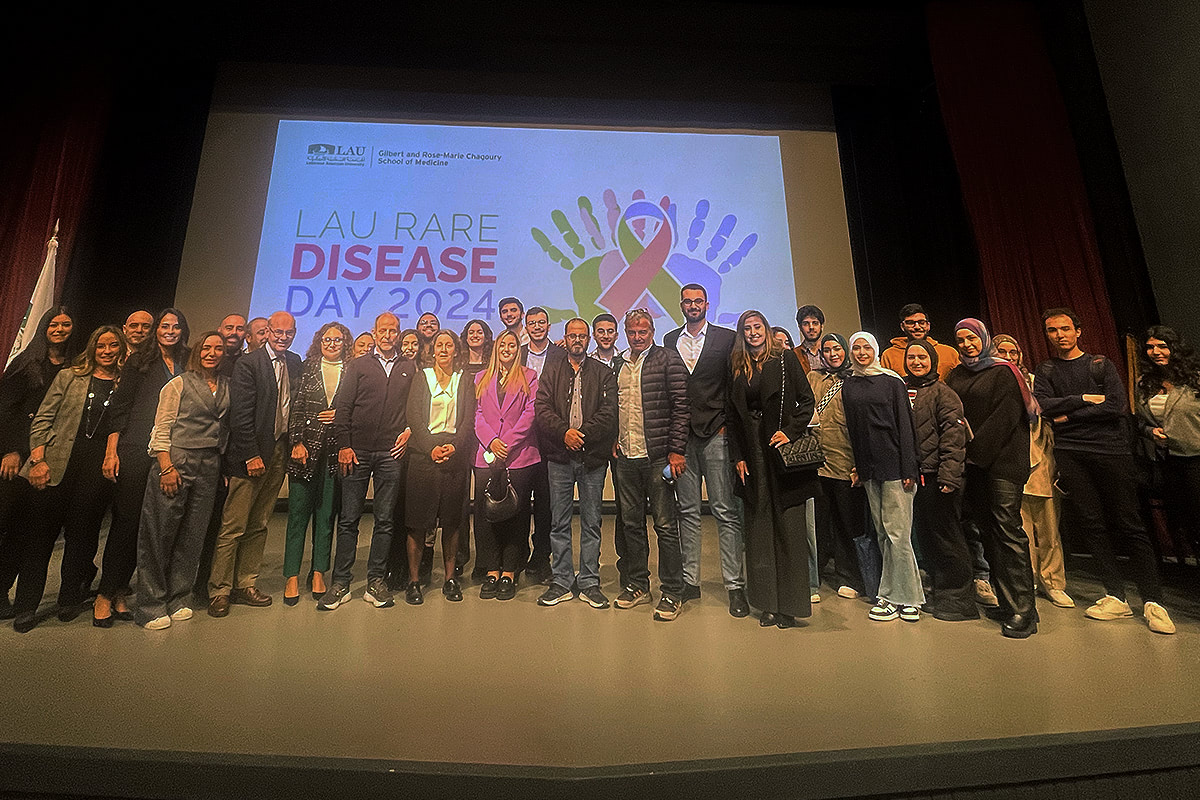LAU Marks Rare Disease Day With a Call for Collaboration
The Department of Human Genetics hosted local and international researchers and physicians in its second annual conference on rare diseases and the latest advances in their diagnosis and treatment.
For the 250,000 patients living with a rare disease in Lebanon, genetic research and interprofessional collaboration are two pathways to alleviate their conditions.
“We owe it to them and their families to advance the body of knowledge through research,” said Professor and Chair of the Department of Human Genetics Andre Megarbane, who is also the assistant dean for Research at the LAU Gilbert and Rose-Marie Chagoury School of Medicine.
Considering that most rare diseases can be linked to a genetic cause, the department is making strides in identifying novel genetic diseases. It offers genetic consulting, exome testing—genetic sequencing used to understand what may be causing symptoms or a disease—and free-of-charge analysis for patients. All these are considered potentially life-saving for patients who are often misdiagnosed and unable to access treatment due to limited research.
Marking Rare Disease Day, which is celebrated globally on the last day of February, the department held two events at Irwin Hall on the Beirut campus that aimed at raising public awareness. The first, on February 29, featured a concert by musicians Bahaa Daou, alumnus Ziad El Ahmadie and Chadi El Ahmadieh, who performed a fusion of Oriental and European music to a full house at the Gulbenkian Amphitheater.
This was followed on March 2 by a medical conference during which local and international researchers and physicians presented on recent advances in clinical and molecular diagnoses, and the latest treatments available to patients in Lebanon and abroad.
In the context of Lebanon, where consanguinity (blood relations) is frequent, rare diseases are not a very rare occurrence, noted Clinical Associate Professor and Assistant Dean for Graduate Medical Education Rajaa Chatila in her opening remarks, which she delivered on behalf of Dean Sola Aoun Bahous.
“Your presence here today,” she said to the attendees and speakers, “signals hope to these patients that you are working to improve their conditions,” underscoring the school’s commitment to foster collaboration in the field of rare diseases.
From skin, hearing impairment and pediatric neurometabolic diseases to hereditary cancer, each of the lectures at the conference was designed to spotlight rare diseases that affect a human organ or function, giving a comprehensive view of their causes and the latest advances in their diagnoses and treatment. The conference also prompted conversations among physicians to share expertise and network, paving the way for future collaborations.
Ranked among the top clinical geneticists worldwide, former head of the Institute of Human Genetics at Nijmegen Radboud University Medical Center and at Maastricht Medical Center in the Netherlands Han Brunner expounded on the genetic causes of intellectual disability. In an interactive presentation, he engaged the attendees with polls and open-ended questions.
Explaining how specific genetic tests can be misleading since many rare diseases often resemble each other from a genetic-sequencing standpoint, Dr. Brunner showed how exome testing can prove to be a more efficient alternative when geneticists are investigating for a diagnosis since it covers all the exons of the genome.
“The standard traditionally driven pathway for testing 150 patients gave us around 11 diagnoses—about 11 percent of them were diagnosed—while an agnostic test with exome sequencing gave 41 diagnoses, almost four times as many diagnoses,” said Dr. Brunner.
At the LAU Department of Human Genetics, the overall positive diagnostic yield has reached 54 percent, said LAU Associate Professor Eliane Chouery, noting that in recent months, the department has been fielding exome test requests at a rate of 10 per week, as it remains the only university-affiliated center to conduct this test in Lebanon. The cost of exome sequencing at the department, added Dr. Chouery, is among the cheapest in the world, and the analysis is offered to patients free of charge.
Building on this, LAU Assistant Professor Cybel Mehawej underscored a point that was brought up in more than one presentation: the fast-paced genetic discoveries meant that if a patient is undiagnosed, their test results could still be reviewed at a later stage for a more accurate diagnosis.
“The multidisciplinary approach we follow allows for open communications with the physicians, where we can ask them to reevaluate and/or refer the patient to a specialist in case we come across anything atypical,” she said.
This drive to discover is central to the department’s ethos. “So far, scientists have estimated humans to have 20,000 genes, out of which only 4,000 are linked to diseases,” said Dr. Chouery. “While we can say that we have an understanding of our genome, we still have much more to uncover,” she added.
In that regard, LAU faculty, including Dr. Chouery, have benefited from the President’s Intramural Research Fund (PIRF) which not only supports researchers but also helps them secure preliminary data that can serve as a springboard when applying to extramural, larger-scale grants.
One of the attendees at the conference, nursing pre-med student from the Alice Ramez Chagoury School of Nursing Jamal Yamout was in awe of the new information she learned at the conference. “Much of what I heard today gives me hope for my own relatives who are living with rare diseases,” she said, adding that the field is of great interest to her.
“We have dedicated our careers and lives to serving the patients affected by rare diseases,” concluded Dr. Mehawej. “We have to raise awareness not only to the community at large but also among the community of healthcare providers because, together, we can identify genetic diseases early on,” she added.
